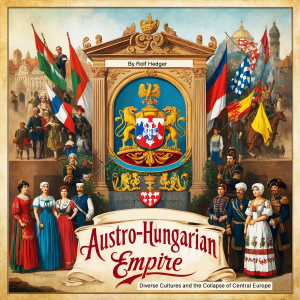

Austro-Hungarian Empire
Rolf Hedger
This audiobook is narrated by a digital voice.
The Austro-Hungarian Empire remains one of the most complex and fascinating political entities in European history. Formed in 1867 as a dual monarchy under the rule of the Habsburg dynasty, it was both a formidable power and a fragile mosaic of cultures, languages, and national aspirations. Stretching from the Alps to the Carpathians and the Adriatic to the Danube, the empire was home to more than a dozen major ethnic groups—each with its own customs, history, and ambitions. It was a realm where German, Hungarian, Czech, Slovak, Polish, Ruthenian, Romanian, Croatian, Serbian, Slovenian, Italian, and Yiddish voices coexisted—sometimes peacefully, sometimes in bitter rivalry.
This book seeks to explore the inner workings of this imperial experiment: how it functioned, how its people lived together, and why, ultimately, it could not endure the turbulence of the early twentieth century. More than just a historical overview, it is an examination of cultural plurality and political fragility, and how the tension between unity and diversity shaped both the empire’s grandeur and its unraveling.
The Austro-Hungarian Empire stood as a unique model of governance, balancing centralized authority with regional autonomy. Its institutions were sophisticated but often inefficient; its bureaucracy capable yet burdened by the demands of multilingual communication and nationalist pressures. In many ways, it was a precursor to the European Union—an attempt to unify diverse peoples under shared interests while preserving local identities.
Duration - 1h 47m.
Author - Rolf Hedger.
Narrator - Digital Voice Marcus G.
Published Date - Wednesday, 29 January 2025.
Copyright - © 2025 Rolf Hedger ©.
Location:
United States
Description:
This audiobook is narrated by a digital voice. The Austro-Hungarian Empire remains one of the most complex and fascinating political entities in European history. Formed in 1867 as a dual monarchy under the rule of the Habsburg dynasty, it was both a formidable power and a fragile mosaic of cultures, languages, and national aspirations. Stretching from the Alps to the Carpathians and the Adriatic to the Danube, the empire was home to more than a dozen major ethnic groups—each with its own customs, history, and ambitions. It was a realm where German, Hungarian, Czech, Slovak, Polish, Ruthenian, Romanian, Croatian, Serbian, Slovenian, Italian, and Yiddish voices coexisted—sometimes peacefully, sometimes in bitter rivalry. This book seeks to explore the inner workings of this imperial experiment: how it functioned, how its people lived together, and why, ultimately, it could not endure the turbulence of the early twentieth century. More than just a historical overview, it is an examination of cultural plurality and political fragility, and how the tension between unity and diversity shaped both the empire’s grandeur and its unraveling. The Austro-Hungarian Empire stood as a unique model of governance, balancing centralized authority with regional autonomy. Its institutions were sophisticated but often inefficient; its bureaucracy capable yet burdened by the demands of multilingual communication and nationalist pressures. In many ways, it was a precursor to the European Union—an attempt to unify diverse peoples under shared interests while preserving local identities. Duration - 1h 47m. Author - Rolf Hedger. Narrator - Digital Voice Marcus G. Published Date - Wednesday, 29 January 2025. Copyright - © 2025 Rolf Hedger ©.
Language:
English
Austro-Hungarian Empire
Duration:01:47:44